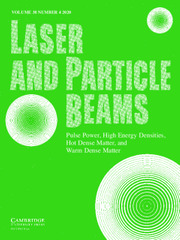Article contents
Effect of dc-magnetic field on the growth rate of Raman backscattering of X-mode laser in magnetized collisional plasma
Published online by Cambridge University Press: 09 December 2015
Abstract
Stimulated Raman backward scattering of an X-mode laser beam propagating in a homogenous plasma is studied in the presence of a transverse magnetic field. As the laser propagates in its X-mode in plasma, it decays into an upper hybrid wave and a down-shifted sideband wave. Beating the incident laser with the sideband exerts a nonlinear ponderomotive force acting on plasma electrons driving the excited upper hybrid wave. The incident wave then parametrically couples with the upper hybrid wave to drive the sideband. Using the fluid model and nonlinear current density, the nonlinear ponderomotive force is obtained to find the dispersion relation of the scattered sideband wave and the growth rate of the instability in the weakly relativistic regime. It is shown that the growth rate decreases and the cut-off points in the normalized wave number of the upper-hybrid wave become smaller by increasing the static magnetic field.
Information
- Type
- Research Article
- Information
- Copyright
- Copyright © Cambridge University Press 2015
References
REFERENCES
- 7
- Cited by

